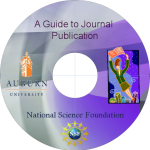

Ethical Considerations
Unfortunately, dishonesty and lack of integrity do exist in academic publishing. These can take many forms but the three most common are plagiarism, fraudulent publications and duplicate publications. Plagiarism is probably the issue that occurs most often and the availability of papers in electronic form on the web has caused this problem to grow. Another issue is Conflict of Interest (as author or reviewer). Finally, the etiquette of authorship is discussed.
As an author, do not plagiarize! Be conservative when it comes to adapting or restating text, figures, or other parts of a paper from another source. If you are summarizing or rewording material from a previous source (even your own) make sure it is properly cited. If you are reproducing material, even as short as a sentence, from a previous source, you must indicate that this is an excerpt or quotation. Quote shorter items, and indent and set off longer items and make sure that the reader clearly knows that this is a direct excerpt and give the proper citation.
Beware that as an advisor or coauthor, you could be participating in plagiarism without knowing it. Make sure your students (and coauthors) know what plagiarism is, and that it is unacceptable. If you suspect something in a paper you are coauthoring might be plagiarized, check it out. This is your reputation and an accusation of plagiarism could have disastrous professional ramifications.
What if you are plagiarized? You should provide the evidence of plagiarism to the organizers of the entity which published the plagiarized paper (the editor of a journal or the conference chair of a conference proceedings). Depending on the situation, you might contact the plagiarizers directly or even their academic superiors (a Dean or Provost). Plagiarism is never acceptable, and if your work is used improperly you should pursue the issue.
Fraudulent publications are those which include known falsehoods, such as presenting results which are untrue or don't exist. Clearly this is wrong. Again, you might be participating unknowingly in this form of dishonesty when you write with coauthors. If you suspect a problem with the methods or results reported, check it out. Retracting a fraudulent publication would be a significantly negative action in anyone's career.
Finally, the duplicate publication issue. While most authors understand it is wrong to submit the same paper to different potential publishers at the same time (many journals require authors to affirm that the paper being submitted is not currently being considered elsewhere), the issue is grayer when it comes to significantly overlapping papers. Be careful about trying to get multiple publications from a set of research. If your papers contain significant overlap, you could be in violation of copyright should they be published, and if nothing else, it could be easily seen that you were milking too much out of the research, which would detract from your professional reputation.
Conflict of Interest is a situation where as an author you are not unbiased or as a reviewer you are not unbiased. If your paper publicizes commercial products or services in which you have a personal interest, this is a Conflict of Interest. If you are reviewing a paper by a close friend or a co-PI, this might be a Conflict of Interest.
As a final note on author etiquette, if you submit a paper for publication with coauthors, make sure that the coauthors know and agree to the paper and the prospective journal (or conference). Make sure also that everyone is in agreement on the ordering of the authors. It is very disconcerting to be listed as an author without even knowing of the paper's existence (yes, this does happen!). Conversely, if you submit a paper without naming a coauthor who should have been a coauthor (such as an advisor), this is unethical. There have been cases, even those that resulted in litigation, where a researcher has read a paper published by a colleague without his/her knowledge, and that publication included the researcher's work and/or ideas. Clearly, you will want to steer clear of such murky waters when you publish.
Some Articles on Plagiarism:
Bogdanowicz, A., "Copy-and-Paste Put Profs On the Offensive," IEEE The Institute, March 2007, Electronic resource, Accessed: 05/06/2007,
URL: http://bmsmail3.ieee.org/u/5788/41269706
Bogdanowicz, A., "The Plagiarism Problem: Now You Can Help," IEEE The Institute, March 2007, Electronic resource, Accessed: 05/06/2007,
URL: http://bmsmail3.ieee.org/u/5789/41269706
King, C. R., "Ethical Issues in Writing and Publishing," Clinical Journal of Oncology Nursing, May/June 2001, Vol 5, No 3.
